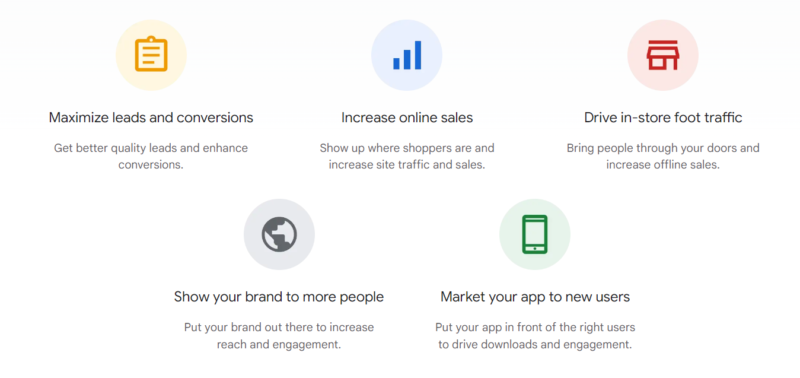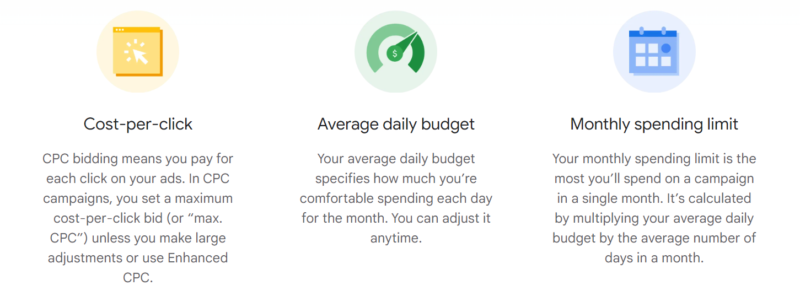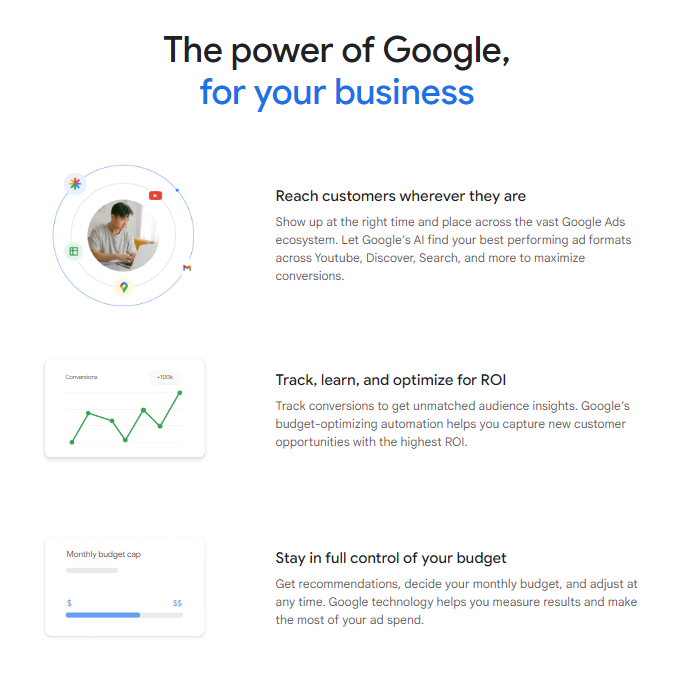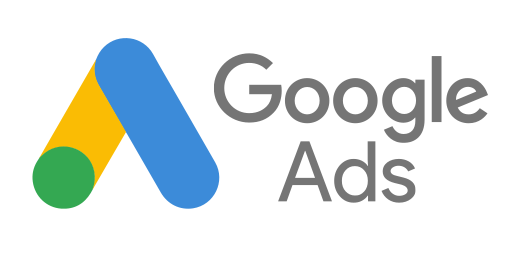Google Ads Review:
Google Ads is a powerful online advertising platform that allows businesses of all sizes to display ads across Google’s extensive network, including search results, websites, and YouTube videos. It’s designed to help businesses reach a broader audience, drive traffic, and increase sales through targeted advertising campaigns. This review will delve into the main features, pros and cons, user experience, pricing, and community and customer support of Google Ads.
Table of Contents
Google Ads Features
Google Ads offers a robust set of features that cater to a wide range of advertising needs. Key functionalities include keyword targeting, where businesses can display ads based on specific words or phrases their target audience might use during Google searches. The platform also supports various ad formats, such as text-based search ads, graphic display ads, YouTube video ads, and in-app mobile ads, providing versatility in how businesses can reach their audience. Additionally, Google Ads offers advanced tools for ad performance tracking and analytics, enabling advertisers to measure the effectiveness of their campaigns and make data-driven decisions.
Google Ads Key Features
- Search Ads: These are text ads that appear on Google search results pages. For example, when a user searches for a specific keyword related to the products or services offered by an advertiser, the advertiser’s ad may appear above or below the organic search results.
- Display Ads: These are visual advertisements that appear on a vast network of websites across the internet that participate in the Google Display Network. Display ads can be in the form of images, banners, or videos and are used to reach users browsing websites related to the advertiser’s business.
- Video Ads: Typically run on YouTube and other video platforms, these ads can appear before, during, or after a video stream. This format is ideal for advertisers who want to engage users with compelling video content.
- Shopping Ads: These ads showcase products directly in Google search results and on the Google Shopping tab. They include rich product information, such as the product image, price, and merchant name, and are highly effective for e-commerce businesses looking to drive sales.
- App Campaigns: These ads promote mobile applications across Google’s entire advertising network, including Search, Google Play, YouTube, and the Google Display Network. App campaigns use machine learning to optimize where and how the ads are displayed to maximize installations.
- Local Ads: Designed for local businesses that want to drive traffic not just to their website but also directly into their physical locations. These ads can appear on both Google Search and Maps.
- Keyword Targeting: Google Ads allows advertisers to target specific keyword searches, which enables ads to be displayed to users who demonstrate intent related to those keywords.
- Conversion Tracking: The platform offers tools to track actions that users take after clicking on ads. This can include purchasing a product, signing up for a newsletter, or making a phone call. Understanding these conversions helps advertisers measure the effectiveness of their ads and optimize accordingly.
- Budget Control: Advertisers can set daily budgets for their campaigns to control costs. Google Ads operates on an auction system, which ensures that advertisers are only paying the minimum amount necessary to outbid the competitor below them.

Google Ads Pros & Cons
Pros:
- Vast Reach: Google’s extensive network ensures that ads can reach a massive audience across different platforms and devices.
- High Customizability: Offers various targeting options, including demographic, location, language, and online behavior.
- Strong ROI: Effective use of Google Ads can lead to a significant return on investment thanks to precise targeting and cost-per-click pricing.
Cons:
- Complexity: The platform can be complex and overwhelming for beginners due to its many features and options.
- Cost: Depending on the industry and keywords targeted, Google Ads can be expensive, particularly in highly competitive sectors.
- Maintenance: Requires regular monitoring and optimization to maintain performance, which can be time-consuming.
User Experience
Users of Google Ads generally report a positive experience, citing its effectiveness in driving traffic and sales. The platform is praised for its detailed analytics and reporting tools, which help advertisers track success and adjust campaigns as needed. However, new users often find the platform challenging to navigate initially due to its complexity and the depth of available options.
Google Ads Pricing
Google Ads operates on a pay-per-click (PPC) model, meaning businesses only pay when someone clicks on their ad. The cost per click can vary widely based on the competitiveness of the keywords and the targeting settings chosen. Google Ads offers flexibility in budgeting, allowing advertisers to set daily budgets and adjust them at any time. For those new to Google Ads, managing costs can be a challenge without proper understanding and management of the system.

Community and Customer Support
Google offers extensive support for Google Ads users through various channels. This includes a comprehensive help center with articles and tutorials, as well as community forums where users can ask questions and share advice. For direct support, Google provides phone, email, and live chat options, though accessibility can vary by region and the specific needs of the business. The platform also offers training resources and certifications through the Google Ads Academy, helping users improve their skills and knowledge of online advertising.
Integration and Flexibility
Google Ads is highly integrative, offering connections with other Google services like Analytics for enhanced tracking and insights, as well as with third-party tools via APIs. This flexibility makes it a powerful tool for businesses looking to create a cohesive digital marketing strategy that includes data from various sources.

Google Ads Target Audience
- Small Business Owners: Entrepreneurs who want to increase their online presence and drive local traffic to their stores or websites.
- E-commerce Businesses: Online retailers that use targeted ads to boost product sales and brand visibility across the web.
- Digital Marketing Agencies: Agencies that manage advertising campaigns for multiple clients and need scalable, efficient tools to handle various accounts and strategies.
- Content Creators and Bloggers: Individuals who use ads to promote their content, increase traffic, and monetize their websites or channels.
- Corporate Marketers: Professionals in medium to large companies who aim to strengthen brand presence, generate leads, and enhance online engagement.
- Non-Profit Organizations: These groups use Google Ads to promote their causes, increase awareness, and drive donations or participation in events.
- Freelancers: Independent experts in fields such as graphic design, writing, or consulting who advertise their services to a broader audience.
- Tech Startups: New technology companies that need to build brand recognition and attract early adopters and investors.
- Real Estate Agents: Realtors who advertise properties and services to potential buyers and sellers within specific geographic areas.
- Event Organizers: Those who need to promote events, conferences, or webinars to increase ticket sales and registrations.
Final Verdict
Google Ads stands as a cornerstone of digital advertising, offering unmatched scope and versatility for businesses and individuals aiming to enhance their online presence. Its ability to reach a vast audience across Google’s extensive network—including search engines, websites, and videos—makes it an indispensable tool for anyone looking to drive traffic, increase sales, or build brand awareness.
The platform’s robust targeting capabilities, combined with detailed analytics, allow users to tailor their campaigns precisely and adjust strategies based on real-time data, maximizing the effectiveness of each ad dollar spent. While Google Ads can be complex and may require a learning curve, the potential returns in terms of audience engagement and ROI make it a worthwhile investment for marketers at all levels.
Additionally, the comprehensive support resources, including a vibrant community forum and professional customer service, provide valuable assistance to ensure users can leverage the platform’s full potential. Whether you are a small business owner, a digital marketing agency, or a large corporation, Google Ads offers the tools and scalability to meet diverse advertising needs and help achieve your marketing goals. As such, Google Ads remains a top recommendation for anyone serious about succeeding in the competitive digital landscape.





